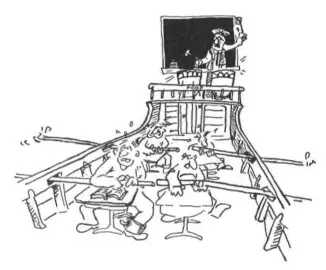Richard Bandler - Using Your Brain —for a CHANGE
- Название:Using Your Brain —for a CHANGE
- Автор:
- Жанр:
- Издательство:Real People Press
- Год:1985
- Город:Moab, Utah
- ISBN:0–911226–26–5
- Рейтинг:
- Избранное:Добавить в избранное
-
Отзывы:
-
Ваша оценка:
Richard Bandler - Using Your Brain —for a CHANGE краткое содержание
Bandler is an innovator and an original thinker in the field of psychology. This book is a transcript of Bandler live in front of an audience, cutting up and cracking jokes as he is prone to do, talking about some of his unique and often practical views on how you can change your feelings, thoughts and behavior. Change is often easier than you think if you use the right method.
Using Your Brain —for a CHANGE - читать онлайн бесплатно полную версию (весь текст целиком)
Интервал:
Закладка:
The process of changing a belief is relatively easy, as long as you have the person's consent. It's a little tougher if the person doesn't want to change a belief. I've also presupposed that you can identify a belief that's worth changing. Sometimes that's not obvious, and it may take some work to determine what someone's limiting belief is. Often the belief that the person wants to change isn't the one that actually limits his behavior.
My principal goal here is to teach you a. process that you can use to change a belief. However, the content that you put into a belief is also important. That's why I asked you to be sure to do an ecology check, as well as to state the new belief in terms of a process, rather than a goal, and to state it in positive terms. I asked you to do this belief change process without knowing the content of the new belief, because I know that some of you would get lost in the content and have trouble learning the process. After you have learned the process thoroughly, you won't be as likely to get lost in the content. When you're working with your clients, it's a good idea to know something about the content, so that you can verify that the new belief is stated in positive terms, is a process rather than a goal, and that it's likely to be ecological. Beliefs are very powerful things; when you change one it can do a lot of good, but if you install the wrong one, it can do a lot of harm, too. I want you to be very careful about the kinds of new beliefs you go around installing in people.
VII. Learning

I have always thought it was interesting that when people are arguing about a point that doesn't matter, they say "It's academic." John Grinder and I were forced to leave teaching at the University of California because we were teaching undergraduates to do things in their lives. That was the complaint against us. They said school was only for teaching people about things.
When I was an undergraduate, the only courses I did badly in were psychology and public speaking. I flunked psychology 1A, and I got a "D" in public speaking! How's that for a joke? NLP is my revenge.
In my contacts with educators, I've noticed that the people who teach a subject may be very good at it, and know a tot about that particular area. However, they usually know very little about how they learned it, and even less about how to teach it to someone else. I went to a lecture in a beginning chemistry class once. The professor walked up in front of 350 people and said, "Now I want you to imagine a mirror here, and in front of the mirror is a DNA helix molecule, rotating backwards." Some people in the room were going "Ahhh!" They became chemists. Some people in the room were going "Huh?" They did not become chemists. Some people in the room were going "Urghh!" They became therapists!
That professor had no idea that most people can't visualize in the detailed way that he did. That kind of visualization is a prerequisite for a successful career in chemistry, and it is a skill that can be taught to people who don't yet know how to visualize well. But since that professor presupposed that everyone else could already do what he did, he was wasting his time with most of the people in his classes.
Most studies of the learning process have been "objective." What NLP does is to explore the subjective experience of the processes by which people learn things. "Objective" studies usually study people who have the problem; NLP studies the subjective experience of people who have the solution. If you study dyslexia, you'll learn a lot about dyslexia. But if you want to teach kids how to read, it makes sense to study people who can read well.
When we made up the name "Neuro–Linguistic Programming," a lot of people said, "It sounds like 'mind control,' " as if that were something bad. I said "Yes, of course." If you don't begin to control and use your own brain, then you have to just leave it to chance. That is sort of what our educational system is like. They keep the content in front of you for twelve years; if you learn it, then they taught it to you. There are a lot of ways that the existing educational system is failing, and I'd like to discuss several of them.
"School phobias "
One of the most pervasive problems is that a lot of kids have already had bad experiences in school. Because of this, a certain subject, or school in general, becomes a cue that triggers bad memories that make a kid feel bad. And in case you haven't noticed, people don't learn very much when they're feeling bad. If a kid's response is really strong, psychologists even describe it as a "school phobia." Feeling bad in response to school situations can be changed rapidly by using a number of the techniques we've described and demonstrated earlier, but I'd like to show you another very simple way to do it.
How many of you have bad feelings about mathematics —fractions, square roots, quadratic equations and stuff like that? (He writes a long string of equations on the board and a number of people groan or sigh.)
Now close your eyes and think of an experience you had that was absolutely marvelous — some situation in which you felt excited and curious. . . .
Now open your eyes for a second or two to look at these equations, and then close your eyes and return to that marvelous experience. . . .
Now open your eyes to look at the equations for several seconds more, and then return to your exciting experience again. Alternate a few more times until those two experiences are thoroughly integrated. . . .
Now it's time to test. First look away and think of any experience that's neutral for you, . . . and then look up here at the equations, and notice your response – Man: My God, it works!
This is actually an old NLP method we call "integrating anchors." If you want to know more about that, you can read Frogs into Princes. Changing most bad responses to school can be done that easily and quickly, but you have to know how the brain works to be able to do it. (If you want to try this method yourself, you will find a page of equations in Appendix VI.)
A more imaginative way to use the same principle is to always connect learning with fun and enjoyment to start with. In most schools they have the kids all lined up sitting still in neat, silent rows. I always ask, "How long until the kids get to laugh, move, and enjoy themselves?" If you connect boredom and discomfort with learning, it's no wonder nobody wants to do it. One of the great things about computer–assisted education is that computers are more fun to be with than most teachers. Computers have infinite patience, and never make kids feel bad the way a lot of teachers do.
Remembering
Another major problem for many kids is remembering the stuff they learn in school. A lot of what is called education is simply memorizing. This is changing somewhat. Teachers are starting to realize that the amount of information is so huge, expanding so rapidly, and changing so fast, that memorization isn't nearly as
important as they used to think. It's much more important now to be able to find the facts when you need them, use them, and forget them. However, you do have to be able to remember how to do that.
One aspect of memory is similar to what we just discussed: Is the memory paired with a pleasant or unpleasant experience? In order for someone to remember something, he has to go back into the state of consciousness in which the information was provided. That's how memory works. If you make someone angry or unhappy when you ask him to do something, in order to remember it he has to get back into that state. Since he doesn't want to feel bad, he is not likely to remember it. This is why most of us have total amnesia for 12 or 16 years of education. I can't even remember teachers' names let alone most of what I was taught or any of the events. But I can remember the last day of school!
What's your name?
Woman: Lydia.
You forgot your name tag. 1The only way I can remember names is to hallucinate name tags on people. Every time I meet people I keep looking at their left breast; people think I'm a pervert now. I taught for Xerox once and since everybody had Xerox labels on, I kept calling people "Xerox" all day. It's one of those things; your brain learns to do it, and once it realizes it's of no value it continues anyway.
Lydia, if you forget your name tag, I'll think that you are sneaking into this seminar, and I'll install certain suggestions . . . that will stay with you for the rest of your life. If you have a name tag, I don't do that. You only get suggestions that stay with you for a short period of time.
Lydia, I'm going to tell you a number: 357. Now I want you to forget the number I just told you. . . . Have you forgotten it yet? (No.) If you can't forget one number when a number has no meaning, how could you forget your name tag, or important content in a seminar? Have you forgotten it yet? (No.) Now, how is it possible that you can't forget something that has no importance?
Lydia: If we keep talking about it, I'll remember it even more. It doesn't matter if it is important or not. Especially since you are asking me to forget it, I won't forget it.
That makes sense. . . . Did you see how many people nodded when you said that? "Oh yeah, you asked me to forget it, so I have to remember it. After all, it has no importance but we are talking about it. If you ask me to forget something that has been talked about for a long time that isn't important, I have to remember it." It's bizarre, isn't it? ... But she is right.
It sounds weird, but even though it sounds weird, you know she's right. Her saying that is as weird as her doing it. Yet psychologists will ignore that as if it has no significance, and go on to study things like "oedipal complexes" and many other strange things. Psychologists will pass up studying how people remember things in favor of studying what "depth" of trance you have been in — that's the metaphor where trance is a hole that you fall into, and going deeper is of great value. The people who talk about "levels of consciousness" disagree; they think it's better to go higher, not deeper.
If I didn't talk about it very long, and talked about it in just the right way, she could forget a number with only three digits. Lydia can forget her name tag, even though people told her it was important. Many of you try to get people to remember things. How many of you talk to people about things that are important, yet they forget what you said? And you thought it was their fault! Remember that when you want someone else to remember something.
Except for torturing rats, probably more psychologists' time has gone into studying memory than any other subject. However, they've never really gotten at how people do it in terms of subjective experience.
How many of you have trouble remembering telephone numbers? Most of you probably try to do it auditorily, by verbally repeating the numbers to yourself. Many of you were taught the multiplication tables by auditory recitation. Even when that is successful, it's very slow, because you have to recite all those words inside to get to the answer. "Nine, seven, three . . . zero, four, six, eight"; "Nine times six is fifty–four." For a lot of information it's much more efficient to memorize it visually instead of auditorily: 973–0468, 9 x 6 = 54. When you remember visually, the entire picture pops into your mind at once, and you just skip to the information you need, and read it or copy it down. A lot of kids who are considered "slow learners" are simply remembering auditorily instead of visually. When you take an hour or two to teach them how to do it visually, they learn much more rapidly.
Читать дальшеИнтервал:
Закладка:








